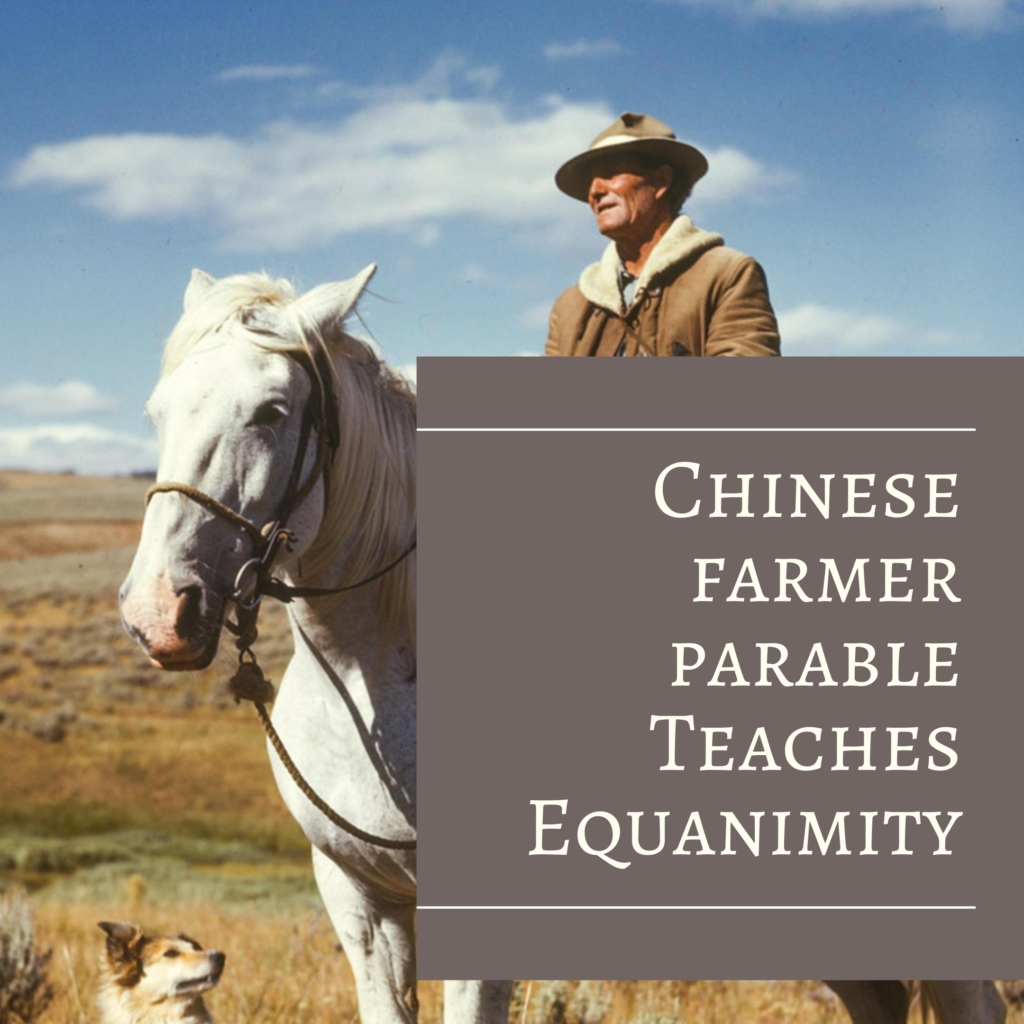One of the most important lessons I give my clients is to avoid judging a situation too quickly. This is because every event, good or bad, has the potential of positive or negative results.
Today’s article introduces you to this concept. If you’re tired of always overreacting to situations in life, this article is for you.
Using the Chinese farmer parable, this article will introduce you to the concept of equanimity and how you can develop this mindset.
Here’s what you’ll learn:
Let’s get right into it.
What is Equanimity?
How do you react in case of good or bad news?
If you’re like most, you react extremely negatively to bad news and over celebrate in case of good news. Bad news results in stress, while good news results in excitement.
People with an equanimity mindset don’t judge an event as good or bad. Whether good or bad, someone with an equanimous mindset will maintain their composure and avoid overreacting.
However, being equanimous doesn’t mean suppressing emotions. You can still celebrate success and acknowledge negative situations
A person who’s cultivated equanimity doesn’t cling to events. They may celebrate pleasurable events but don’t get carried away. The same goes for unpleasant events. A person with an equanimous mindset will acknowledge negative situations but avoid dwelling on the situation’s negative effects.
To better understand equanimity, let’s take the example of the Chinese farmer parable.

The Chinese Farmer Parable
Once upon a time, there was an old farmer who had worked his crops for many years. One day his horse ran away. Upon hearing the news, his neighbors came to visit. “Such bad luck,” they said sympathetically.
“Perhaps,” the farmer replied.
The next morning the horse returned, bringing with it seven other wild horses. “What great luck!” the neighbors exclaimed.
“Perhaps,” replied the old man.
The following day, his son tried to ride one of the untamed horses, was thrown, and broke his leg. The neighbors again came to offer their sympathy for his misfortune.
“Perhaps,” answered the farmer.
The day after, military officials came to the village to draft young men into the army. Seeing that the son’s leg was broken, they passed him by. The neighbors congratulated the farmer on how well things had turned out.
“Perhaps,” said the farmer…
How the Chinese Farmer Parable Teaches You Equanimity
From the parable it’s clear that the farmer wasn’t affected by both the positive or negative news. He kept his composure and avoided judging the situation at the moment.
The farmer didn’t divide experiences as good or bad events. He kept an open-minded and undifferentiated approach to life, which is what an equanimity mindset demands.
However, you may be wondering, how do you develop an equanimity mindset in the 21st Century., Keep reading to learn more.
Applying the Chinese Farmer Parable to Modern Life
In my coaching business, I encounter clients who are down on their luck. This often includes people who’ve lost their jobs.
One of the most common characteristics among such clients is the fear that they may not provide for their families.
However, rather than focusing on the negative, I advise such clients to consider the positive side of things. Yes, they’ve lost their jobs. But this loss has resulted in more time to spend with the family or to work on passions.
The loss of a job also provides the client time to improve their skills, which puts them in a better position to get a better and more fulfilling job.
Of course, for the above two scenarios to happen, the client has to shift their mindset and avoid judging a situation too harshly.
This first example illustrates how you can apply the Chinese parable in your life in case of negative events. Rather than focusing on the negative, look for the opportunity to improve and grow.
This parable doesn’t only apply to negative situations. In the same way you avoid overreacting to negative situations, avoid getting carried away by the positives.
This is because we tend to over celebrate the positives. If you win a prize, you’ll celebrate this achievement for several days. However, that shouldn’t be the case. Someone with an equanimity mindset celebrates the achievements but acknowledges that more work has to be done.
They avoid dwelling on the celebration.

Source: Twitter.com (Elon Musk)
How to Cultivate Equanimity in Your Life
For you to cultivate equanimity, you first need to understand what goes on in your mind. Which is where mindfulness comes in.
Through mindfulness, you gain a better understanding of how your mind reacts to different situations. Mindfulness allows you to dig deeper into any negative thoughts you may be clinging to — thoughts about situations out of your control.
Gaining awareness of the clinging negative thoughts gives you the power to loosen your grip on these thoughts, resulting in a feeling of inner peace.
And you don’t have to stop there. You can go a step further and challenge these clinging thoughts. Writing down these clinging thoughts allows you to challenge them and let go once you realize that clinging to such thoughts is fruitless.
Your Turn
Life is a series of both positive and negative experiences. How you react to these experiences is what matters.
By developing an equanimity mindset, you become less prone to overreacting. You increase your chances of being happy since you don’t dwell on the negatives.
I hope this explanation of the Chinese farmer parable was helpful. If you have any questions regarding this parable and how you can develop equanimity, please ask it in the comment section.
I’ll be happy to answer any question asked.
Related Content
